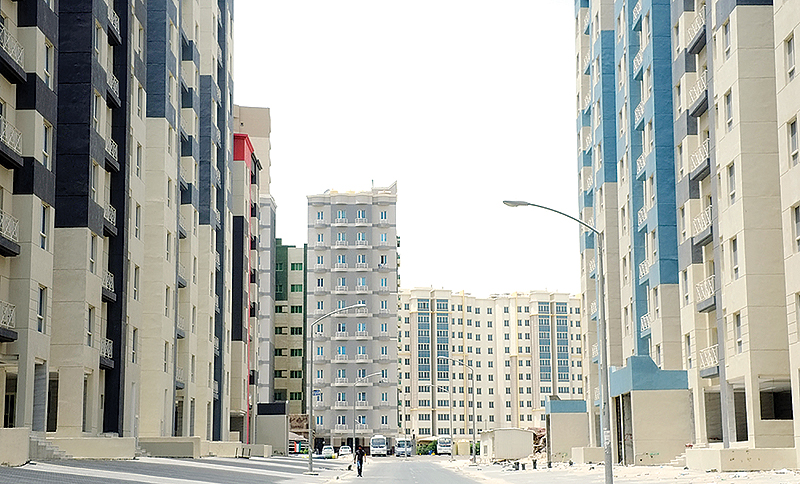Tenants renegotiate amid slump in real estate sector
From Fahaheel to downtown Kuwait City, signs advertising apartments for rents can be found in abundance. Rising costs of living, stagnant wages for expatriates and growing anti-expat government policies are driving foreigners to leave the country.
According to the Central Statistics Department, the number of Filipinos, Indians and Egyptians in Kuwait has dropped sharply in recent months. Filipinos in Kuwait declined from 243,400 to 216,200 - 27,000 Filipinos left the country in the last nine months (almost 12 percent of the total). The Filipino community ranks fourth in number in the country. At the top sit Indians with 889,000, followed by Egyptians at 484,000 and Bangladeshis at 271,000.
According to experts, a phenomenal rise in the cost of living probably is the main factor that led to a slump in the real estate sector. Secretary-General of the Real Estate Union Qais Al-Ghanim said in a recent report that the real estate investment sector will witness more pressure in the coming months with an increasing number of expatriates leaving Kuwait, resulting in more vacant apartments in expat neighborhoods.
"The mounting burden on expatriates day by day due to the increase in fees and the cost of living, in addition to the state's tendency to terminate their services from public sector jobs, have forced many to leave, especially during the past few months. All this had a negative effect on the consumer situation in the country in general and on the investment property sector in particular," Ghanim said.
He pointed out that some property owners, in order to avoid apartments being vacant in their buildings, have resorted to housing singles - up to 12 people in one apartment, which in turn puts great pressure on water and electricity services, in addition to the inconvenience they cause to other tenants in the building. Ghanim explained that investment properties witnessed rent reductions of up to 20 percent during the last period.
The latest statistics available from 2018 indicate that there were around 400,000 apartments in the Kuwait market. New buildings opening over the last twelve months have undoubtedly added to this number at a time when occupancy rates are dropping.
Amid the slump, tenants are finding ways to keep their apartments. Some have resorted to sharing apartments, while others try to renegotiate in order to cope. "I had to take the bull by the horns. I asked our haris for the phone number of the owner of the building. He was reluctant initially, though he gave me the number later. I called him - and luckily enough, he slashed KD 50 off the rent," said Thomas Coelho, an Indian expat living in a three-bedroom apartment in Farwanyia.
Also in Maidan Hawally, an African expat narrated how the tenants renegotiated with real estate managers to bring down the rent of their two-bedroom apartments. "We used to pay KD 250 for a two-bedroom flat, which they later increased to KD 300. Many people left the building, while others decided to sublet their apartments. This actually affected the water and electricity consumption. Before we knew it, the building became overcrowded. So some tenants met the managers to renegotiate the rent, as they threatened to pack out. All turned in our favor. We are now paying KD 260 instead of KD 300," Rasak Karim told Kuwait Times. In his words, "they (real estate managers) preferred to have few decent families in the building rather than having more people and paying more in utility bills".
Some of the tenants Kuwait Times interviewed echoed similar experiences. In Mahboula, Sabrina narrated how her husband was told to pay a lower amount when he opted to move out of the building. "We gave the haris a one-month notice as stated in the rent contract, after which we got a call from the house owner. He asked my husband why he was moving out. My husband complained that he can no longer afford KD 220 in rent for a one-bedroom flat. Surprisingly, he told him to pay KD 180 instead. A KD 40 reduction is a big relief," she said with a smile.
Partition room
The tightly-regulated real estate market has given rise to a black market where tenants sublet with or without the necessary permissions. "After my wife lost her job, we couldn't cope with the rent. I had to beg the haris to allow me to put up a partition. With the KD 70 I get from the new partitioned room every month, I am able to retain the apartment. I only give the haris an extra KD 10 every month in 'appreciation'," Indian expat Kabir Sanjay said.
Like Sanjay, Vijay just shared his two-bedroom apartment with another family. "We agreed to pay KD 125 each since it is a two-bedroom flat. We are only four in the apartment," he said. When asked if he took permission from the haris, he said: "There is no need for that. He is interested only in getting his KD 10 per month and the KD 250 in rent."
Renegotiating rent for an apartment you already live in is a bit hard. The biggest obstacle to overcome is the lack of leverage. There is always a 50-50 chance of success, and as economic hardship mounts, many expats are seeking various ways to make ends meet. There is always a push and pull factor. While most house owners prefer to keep you around, you probably don't even want to deal with the hassle of moving out either. With that in mind, it's in both parties' best interests to come to a tacit agreement.
By Chidi Emmanuel










